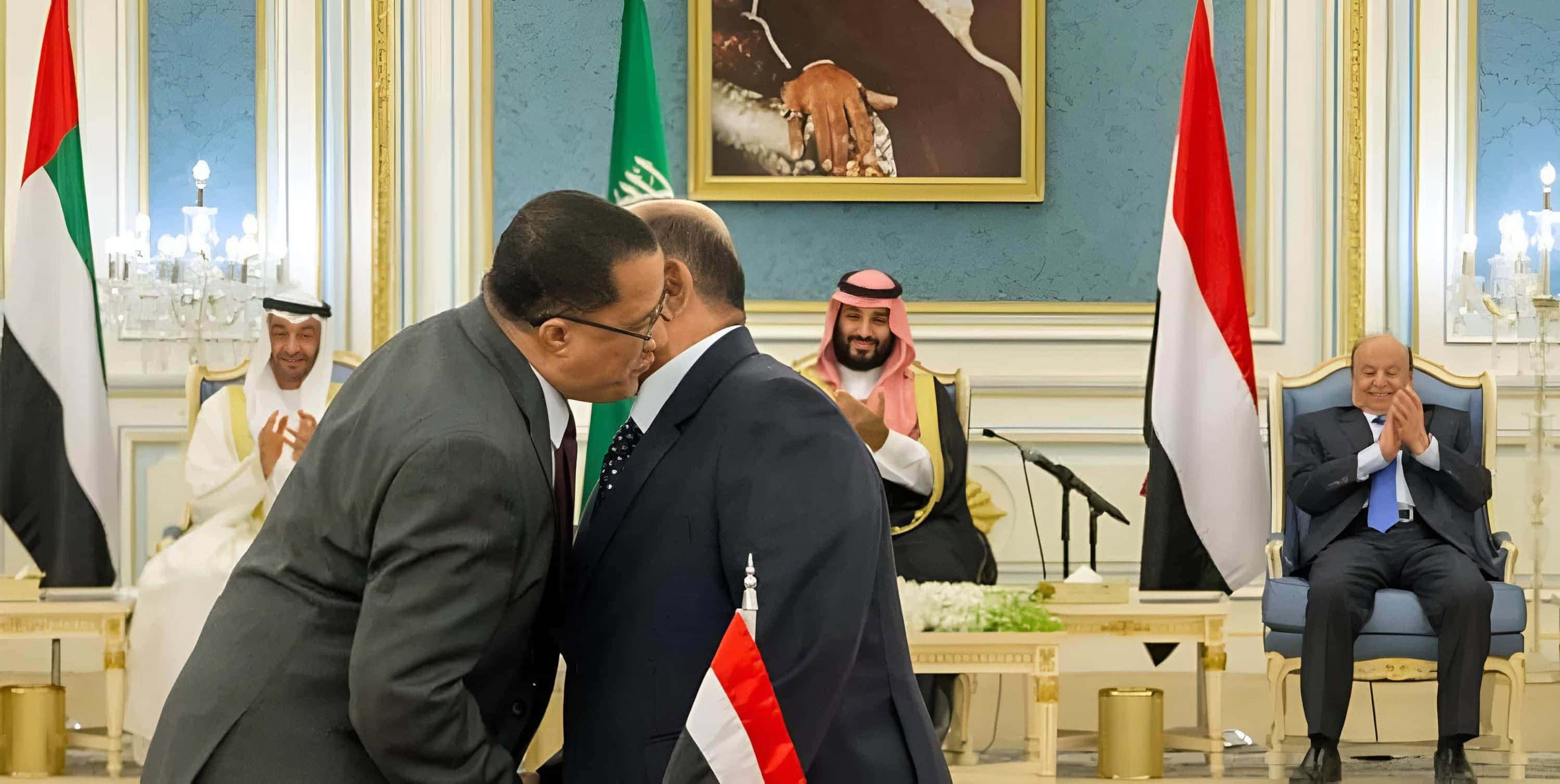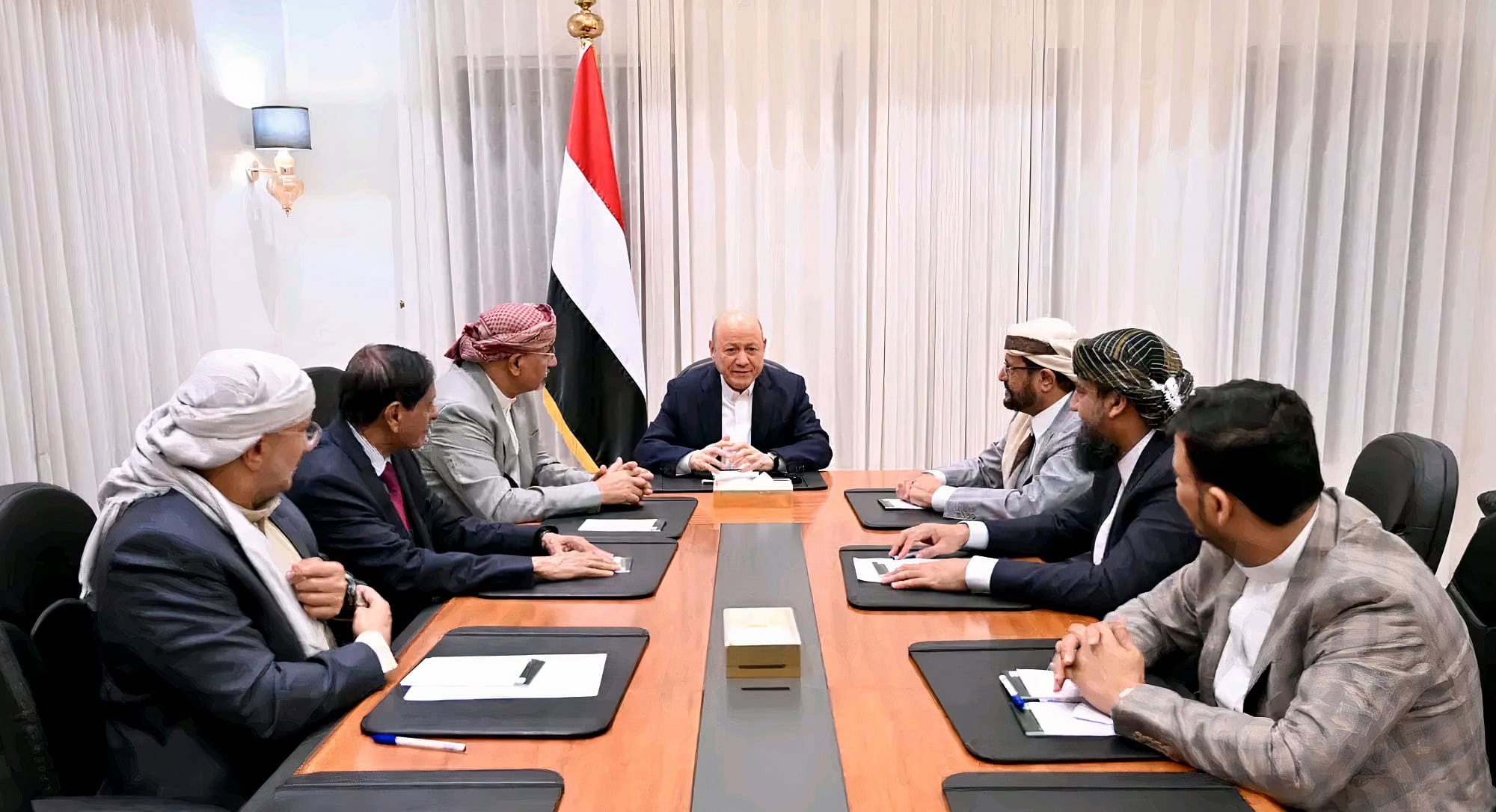
The Riyadh Agreement signing ceremony in November 2019 (Asharq Al-Awsat)
آخر تحديث في: 31-01-2025 الساعة 10 صباحاً بتوقيت عدن
|
|
Despite the prevailing pessimism, there is still a chance to salvage this troubled partnership if there is a genuine intention to address the deficiencies and improve the living conditions. To begin with, the entire agreement must be re-negotiated by Yemeni actors without external pressure from their regional backers.
Ala Mohsen (South24 Center)
The 2019 Riyadh Agreement is an important milestone in Yemen’s ongoing conflict, introducing a power-sharing framework among the anti-Houthi coalition that culminated in the creation of the Presidential Leadership Council (PLC) in April 2022. This power-sharing agreement had a dual objective: defusing tensions between the Southern Transitional Council (STC) and the Internationally Recognized Government (IRG), and improving public services and stabilization efforts in areas under their control. For the STC, the agreement was an instrument to gain recognition by becoming part of the IRG. Meanwhile, the Yemeni government hoped this partnership would integrate the STC and moderate its demands. Ultimately, however, regional powers, especially Saudi Arabia and the United Arab Emirates, played a decisive role in achieving this agreement. The duo successfully pressured their Yemeni allies to accept the deal and share power to prevent fractures within the anti-Houthi coalition.
In the few years post the signing of the Riyadh Agreement and the establishment of the PLC, it is evident that the STC-IRG partnership has largely fallen short of achieving its objectives, resulting in a fragmented authority controlled by proxy actors with conflicting agendas. Instead of cooperating to stabilize the regions under their control, these actors have prioritized their own selfish interests—and those of their backers—over the welfare of Yemenis. The suffering of ordinary people in the liberated areas, particularly in the South, has only worsened since this partnership started, due to the severe deterioration in public services, the devaluation of the local currency, and the inconsistent disbursement of salaries. As a result, the STC faces mounting pressure from its Southern constituencies, who increasingly perceive it as complicit in exacerbating their daily struggles and hardships. At the very least, it is held partially accountable for failing to take meaningful action to alleviate their suffering.
Growing Calls to Reassess the Partnership
As a result of these failures, prominent Southern voices are now demanding a reassessment of the STC-IRG partnership. For instance, Hussein Laqwar, a political analyst, questioned whether the STC’s engagement with the hostile Yemeni government is still a sensible option, describing it as a troubled partnership marked by deep and unsustainable contradictions. Even voices affiliated with the STC are vocal about this problematic partnership. Senior STC member Mansoor Saleh reaffirmed that the STC refuses to be a witness to corruption and the failure of Yemeni parties or the continued deterioration of economic conditions. Saleh added that the STC made every effort to ensure the success of this partnership, enduring hardships and public pressure out of a commitment to achieving what it believed to be shared goals and collective interest, but the other parties have different calculations.
Other STC leaders expressed similar concerns. In his recent interview with AIC TV, Amr Al-Bidh, Special Representative of the STC President for Foreign Affairs, criticized the STC’s partners within the Yemeni government, expressing frustration over their lack of seriousness in confronting the Houthis, failure to implement promised economic reforms, and continued neglect of development of the Southern areas. Along the same lines, Nasser Al-Khobaji, Head of the STC Negotiation Unit, described the status quo as a deviation from the principles of partnership. He warned that this partnership is being undermined by the actions of political forces within the Yemeni government seeking to destabilize the South and undermine the Southern position. These statements reveal a deepening rift between STC officials and their northern partners within the government.
The STC recognizes the urgent need for immediate action to address the deteriorating situation, amidst growing public discontent and anger. A quick glance at social media reveals widespread frustration with the worsening living conditions. Many believe the STC has failed to fulfill its mandate to represent their interests and improve living conditions in Southern areas. Realizing that these challenges have already impacted its legitimacy and popularity among locals, the STC is attempting to rectify its relationships among the grassroots with field visits to the governorates by its communication and political awareness teams. Additionally, the STC fully endorsed the recent protests in Aden to demand the payment of salaries, better living conditions and improved public services. However, these symbolic gestures are obviously not enough and must be followed by decisive action to remedy the situation.
The Need for Change: Two Paths
Continuing with the status quo is not an option for the STC as it incurs high costs politically and socially. To address these challenges and chart a way out, the STC has only two paths. The first option will require the total revocation of the current partnership, reversing all the agreements including the Riyadh Agreement. It will also include bold unilateral moves for self-administration of the Southern regions from Al-Mahra to Bab-Al Mandab. While radical, this option has good popular support and is widely perceived as a necessary step towards stability and self-determination. However, since this step is likely to face opposition from other parties, the STC must be ready to deal with expected pushback from Yemeni actors and regional powers. So far, the STC has attempted to play the “safe” political game -- trying to balance its political mandate with regional priorities in Yemen, especially with the Houthis’ increasing threats and their sustained control over significant parts of Yemen’s territory. However, it is increasingly clear that achieving this balance has become an unattainable goal, given the lack of meaningful progress in stabilization efforts or military advancements against the Houthis.
The second option is less radical and is likely to be the adopted course of action for the next period. This step will involve re-negotiating the current partnership to reflect more ownership and higher involvement of Southerners in the PLC governing structure. For some analysts and activists such as Huda Al-Attas, the whole partnership is not a fair deal as it makes no sense that northerners are represented 50% in the PLC when their territorial control does not even exceed 10% of the total “liberated areas” in the north. A renegotiated agreement should consider these realities, particularly since a 50/50 power-sharing arrangement does not reflect an equitable partnership while the Houthis continue to control Sana’a and the majority of northern regions.
Concluding Remarks: Salvaging the Partnership
Despite the prevailing pessimism, there is still a chance to salvage this troubled partnership if there is a genuine intention to address the deficiencies and improve the living conditions. To begin with, the entire agreement must be re-negotiated by Yemeni actors without external pressure from their regional backers. This would enable the revised agreement to reflect genuine consensus and realistic expectations, rather than being imposed through the influence of Riyadh or Abu Dhabi. Additionally, it is important to acknowledge that any STC-IRG agreement that does not involve the Houthis is only a short-term arrangement to regulate the working relationship between the two signatories during the ongoing conflict. Such an agreement is not supposed to resolve Yemen’s most critical issues, including the Southern question and the future state structure of the country, as that would go beyond its intended objectives. While this agreement can serve as a solid foundation for future agreements, these lingering issues can only be addressed in the final negotiations between all conflict actors.
Finally, without leading a positive change, the STC risks becoming just another Yemeni political party if it continues to focus on high-level politics while neglecting the daily needs and struggles of the masses. It is surprising that the STC knows well it is being used as a scapegoat for the government’s failures and corruption, yet it has taken no action to counter this parasitic behavior. The primary mandate of this partnership was to correct the course of the Hadi (ex-President Abd Rabbo Mansour Hadi) government. Thus, if the STC lacks substantial powers to bring meaningful change within the framework of the current partnership, its continuation becomes increasingly difficult to justify. Although regional pressure has so far sustained this partnership, it is only a matter of time before the Houthis exploit public discontent against the STC, the IRG, and their regional backers and risk reversing all the progress made since 2015.

قبل 3 أشهر